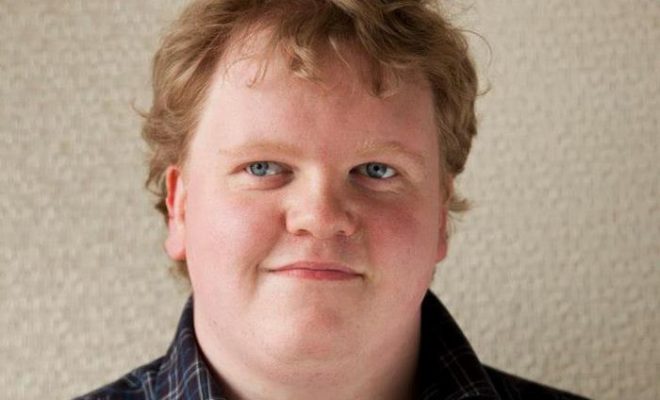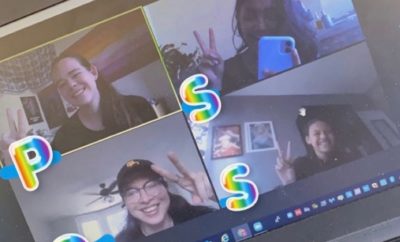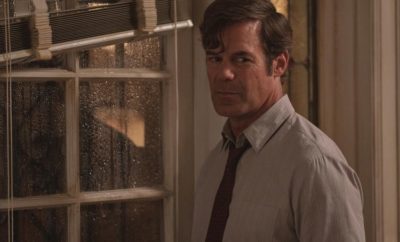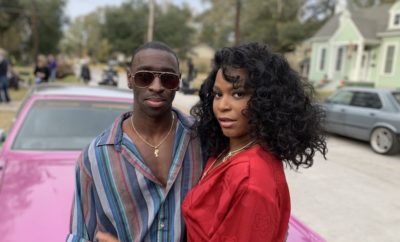
Interviews
RJ Lackie – All For One
By: Lisa Steinberg
Q) We got to see your work recently through All For One. What did you take away from the series?
A) One of the themes I’m really excited about when it comes to “All For One” is kind of the angle of emotional manipulation. It’s hard to do in a lot of projects. I feel like a lot of Lifetime movies do it. It is getting to explore when you are in Dorothy’s position, Alex’s (Alejandra Simmons) position and Rocheford’s position. When you have someone is emotionally manipulative, selfish and very good at hiding it, I really hope people are able to see how they would deal with it and apply it to their own lives if they have struggled with it.
Q) It was nice to have characters whose personalities and backgrounds weren’t so cut and dry.
A) I loved playing with that. I loved having a hero who is doing things for all the right reasons and totally righteous, but a little clueless. She fights for good, even though she doesn’t quite know what she is doing. I feel like a lot of us do that. I feel like a lot of us try to do the right thing and we either mess it up or we don’t quite know what the right thing to do is so we hold back and then we kind of feel guilty about it. I really loved getting to play in those gray areas with morality, emotions, character development, etc.
Q) A lot of the character development seems to happen, but mostly off screen. With web series, there isn’t much time to show it all on screen. How do you such depth to these individuals in such a short time?
A) One thing I try to do is to make sure maybe the characters have shifted off screen…Like, we tend to keep big plot developments off screen such as when the girls break into the union office. We try to keep big character confrontations and moments that typify character evolution on screen so you can see it and really get into the character’s perspective and the conflict. For example, I don’t think we could have done a version of the show with Portia and Ariana’s breakup were off screen. Those kinds of moments of development are so crucial to see and grapple with on camera. We give you the dots and the audience connects them, I like to think. Sarah and I worked very hard on scripts to be sure the dots were there because you don’t want the audience to make too big of a leap to understand the development of the characters. There were some bigger jumps, such as Alex spends a lot of the end of the season off camera going through a difficult time. We are very careful that every character’s arc is very comprehensive. One of the things that is really important to Sarah and I is to make sure every prominent character undergoes some kind of evolution – the character evolves or our understanding of the character evolves. I was really proud that I felt we did that with pretty much every character on screen.
Q) Can you talk about your writing process for “All For One?”
A) The writing process of the show was kind of a little bit of a fever dream. We were working so hard with a very specific window before we needed to be ready for production. So, there has to be some element to magic as to how it actually all came together. Our cast and Shannon (our director) and our whole team were so phenomenal that I felt as writers we set a foundation and they took that and understood it so beautifully, ran with it and took it to something that was ten or fifteen thousand times better.
Q) The live episode was wonderful and so groundbreaking. Viewers got to see it evolve as we watched it.
A) I’m so immensely proud of our team for making that live episode such an amazing experience and for the actors to be so game to tackle first of all such a long script for a web series live…I’m just really so proud of the team for truly excelling with that episode.
Q) Gwen said the best take they had was the live episode that aired!
A) I was still up north when they were filming so I was watching the episodes from afar. The live episode may have been the best take, but those actors were on point every rehearsal. Rehearsals for live you would expect someone to trip, mess-up or even Alejandra with her jumping over couches…Even in rehearsals there were never any missteps. It was kind of amazing! We have a cast who were really well versed in theater so they were totally game for it.
Q) It’s all about the words in the script being brought to life. It was very beautiful and well developed.
A) Working with Sarah was an absolute dream. I’ve never worked with a cowriter before, at least not on a project like this and not so intimately. It was just phenomenal how we got to have our two styles mesh. It was very seamless it felt. We built character journeys on the page that we were very excited about and it was really cool seeing actors who had done so much work to make sure these character are real and bring them to life. We were very careful to bring specific journeys and voices and then to see actors take those cues to turn them into full realized people was so cool.
Q) There are also a part of “All For One” that are talked about, but not seen on screen. Was Anne meant to be such a secret or a “How I Met Your Mother” capacity?
A) I would definitely like to see Anne on screen. Depending on what happens with the future of the series, we haven’t necessarily even had conversations about creating a potential Season Two. So, everything is subject to change. Those characters that appear off screen like Monty, Anne and maybe even Rick I’d be totally excited to see them on screen. Anne and Monty in particular, I think we will. Anne is a really important shadow character for us because she represents something different for every character that talks about her.
Q) We see new dynamics to Anne too where we think of her as being very respectable and professional and then in the middle we hear her texting fun Emojis and having BFF conversations. Then, there is something going on with Treville. There is so much going on!
A) Anne is a really important shadow character for us because she represents different things to each character that talks about her. So, we only really see her mostly through Dorothy’s eyes and occasionally through Treville or Connie’s eyes. I don’t think we got to dig into her relationship with the Musketeers as we could have, but what is really interesting (fingers crossed) for Season Two is to find out who the woman, herself, is and how accurate peoples’ views of her are and what she is really like as a person. Sarah and I have been having development conversations recently about what Anne would like and what it is like being in Mu Sigma Theta. We cued up in the finale what it would be like if Connie (Linnea Currie-Roberts) and Dorothy (Gwenlyn Cumyn) moved into the sorority house. We love the show so even though we haven’t gotten an official go ahead we love these characters too much not to talk about them when we don’t have an official impetus to.
Q) The characters seem to be fearless yet flawed. How have you constructed these characters?
A) When we first sat down the season, Sarah, the story editors and I wanted to figure out what each of the characters were and what the central flaw or issue they are going to have to overcome this season? What are they going to discover about themselves and sort out through conflict? With Ariana, it was her relationship to other people. It was kind of learning to value friends and Mu Sigma Theta beyond a sorority that will make her look good or people her girlfriend really likes. Can she commit to emotional relationships other than Portia? This, of course, played into her dynamics with Portia (Claire Gagnon-King) and why they break up, which is Ariana’s lack of tact and sensitivity and a little bit of ignorance when it comes to Portia’s feelings. With Portia, we knew we wanted to lead up to the moment in the finale where she announced she was going to run for MST President very early in the development process and then we decided Season One was too early to play with that. We were digging into her character and then the idea of this girl who was too lovely for words and if not everyone’s favorite, then someone everyone has an innate fondness for. Even that sense that Ariana (Angie Lopez) and the other musketeers have that they want to protect her. We thought how does Portia feel having to be the one people constantly have to protect and how does she keep ending up in these madcap adventures that Dorothy, Miller and Ariana end up in. She is worried that people don’t respect her. She doesn’t want to rock the boat. She wants to be nice and supportive. And, of course, she is taken to her limit and she has to stand up for herself. I know it is weird to talk about characters like they are people, but I was so proud that Portia did that. Characters can feel like people even when you are creating them. These characters totally feel real to me now. It was a long process of writing and revising 30 scripts, rehearsing, filming, shooting and then post production. I feel like if I needed to sit down and bang out a conversation about Portia and Ariana about chicken, I could. They almost exist independently of Sarah or me, which is really cool when you develop characters to that point. That’s when you start getting really amazing fan fiction – because of characters that do have that depth and consistency that other writers can take that and run with it. It’s really cool! It’s interesting how fan fiction kind of lives as its own self. It stands on its own, but it also exists as a piece of criticism to the original work. It is saying this is something you didn’t do or could have done and chose not to. So, it’s really cool to see how thoughtful and deep a lot of fan fictions approach the task with because there are certain TV shows, movies or comics that kind of desperately need that remixing for their audience to be satisfied. For gay audience members, it can be one of the only ways we can see characters that are beloved and popular that also reflect us. Like the “Give Elsa a Girlfriend” movement or “Give Captain America a Boyfriend” movement. You create a gay character and people who aren’t interested in a gay character won’t allow or support that character to become part of our public mythology. But when you take a character who is already in that space and remix them as a fan to say the LGBT, then you are kind of constructing your own representation which I think is really cool. There is something nice about reading a queer ending that you don’t really get anywhere. LGBT people need pretty much all the stories they can get as long as they are not thinly veiled propaganda designed to get people to want to hate us. There is almost a kind of emotional nutrition for happy endings for queer characters because we see them so rarely and because they are so used to not seeing themselves on screen or on the page. So, I totally understand the recent movement towards encouraging creators for queer people to have happy endings in media. We very specifically made that choice in “All For One.”
Q) You often talk about LGBT representation – good LGBT representation at that. How do we promote more projects that have good LGBT representation and what are you contributing to this?
A) Honestly, I think good representation is a wide breadth of LGBT stories where the creators are cognizant of the tropes and actively try to avoid them. We are at this place in media where because there are so few stories that every time a trope is used it is way more harmful that it should because there aren’t enough shows not using tropes to counterbalance it. If we had thousands of LGBT stories (good and bad) it wouldn’t matter if a bunch of them used these ugly harmful tropes that we’ve seen from the dawn of time. There would be so many options. Right now, there are so many shows that I would like to see more creators looking into the tropes of the identities of the communities that they are dealing with. With regards to promoting good LGBT work, it’s about doing the leg work of finding them (which a lot of us do naturally because a lot of us crave them.) Recommend them to others, talk about them Twitter, Tumblr, signal boosting them and making sure that other people that are looking for it know where to find it. Especially independent LGBT media didn’t have marketing budgets. When we did the Soliloquies of Santiago, our social media department was me and our producer. So, it can be really hard for smaller teams to really get the word out. I think the best way to promote and encourage better LGBT media is to find the ones that are doing it right and signal boost them. Also, talk about why shows or projects aren’t living up to what we need and the kind of tropes we need to be avoiding. As a creator, I try to listen a lot to conversations about tropes and about harmful tendencies in media so that I know to avoid them. But I wouldn’t be able to keep my ears to the ground if no one was having those conversations. So, having conversations about what constitutes harmful media and what constitutes exciting media, what we want to see and making those conversations not necessarily yelled at creator because that can sometimes close ears, but within public view of where creators can see them and engaging those creators in those conversations. I think that’s a really good way of promoting the stories we want to support.
Q) I feel like people need to be more connected to triggers, tropes and traps that shows tend to fall in.
A) That’s a great little alliteration way of remembering those three problems. As a creator, I know when I come across a challenge often times it is an opportunity to come up with something better or more creative. A lot of the TV creators we are seeing have to deal with that already. If they lose a crucial location and need to set something somewhere else or if they lose a crucial actor and they need to get rid of them…So, could avoidance of a harmful trope be as important to them as losing a location or production element? I think if there is a commitment to creating these characters and exploring these communities there has to be a certain level of importance placed on not harming the community. I think you need to stop and ask yourself, should we kill the queer woman? Should we make this character x-stereotypical trait? Even if it serves a version of the story you want, you need to be able to have that conversation and seriously weigh if you can come up with something better. These conversations are really very new for a lot of people, especially in the Hollywood creative communities. There are certain conversations that happen, but opening creators up to social media has allowed it to really blossom and for them to hear viewpoints they really wouldn’t otherwise. I thin another thing we can do that is really important is to find queer creators. Find them on social media, find their works and engage with them (not uncritically of course). If I throw out a necessary trope in my work, it’s just as damaging as if someone else does it. It doesn’t magically become better because I’m gay. But empowering those creators so that we have more creators entering the system who are queer, have that history and have that knowledge of tropes and have that experience of being harmed by them.
Q) It’s incredible to see how many inclusive web series there are.
A) What is nice about web series is that because they are comparatively cheaper to fund, particularly in Canada there is funding support from independent creators. In a way, it is harder to promote for TV shows because TV shows are so expensive to produce. So, we are finally getting filmed media that tasks more risks, but goes after niche communities like queer people. It’s really exciting to see media open up to audiences that had to make due with indie movies that were potentially not well shot, not well written or well directed but at least there is a gay aspect to it. I feel there is a big feeling amongst queer audiences thinking, “Well, it’s not good queer representation, but it’s the closest I’m going to get.” I’m really excited about building a world where people don’t have to say that.
Q) Your project Dorian Gray will mix supernatural and suspense, something often not seen in web series. What can we expect from the Dorian Gray series?
A) I’d say it’s a fair mix because it is both a supernatural show and a love story. So, there is a romance at the heart of it. It’s kind of like the mix that “Carmilla” played with for queer women. You have these two characters whose relationship is key to the plot development and central to the series, but the series isn’t so much about queerness or kissing. It’s about fighting this bad guy or do this or that. I’m speaking in vagueness because the series is still in development. It’s definitely more of a supernatural with queer leads than something like The Outs, my favorite web series of all time. which is a relationship driven dramatic web series.
Q) How will the supernatural be conveyed through a web series come into play?
A0 One of the beautiful things about the concept of Dorian Gray is a man being younger than he should is not difficult to play. You don’t need crazy CGI or a huge effects budget to nail it down. As we’re building the funding for the show, there are certain things we want to produce such as action or fight sequences. Thankfully, the nature of the supernatural elements we’re featuring in Dorian Gray aren’t CGI heavy or special effects heavy, which is nice. That said, if we get our way and we get to make the show, there are definitely some killer fight sequences we can do because the dynamic between Dorian and the central antagonist (which I can’t talk too much about) is really interesting and intense.
Q) The trailer just gives me so many things to process! I’m just excited because it offers so many twists and a lot of direction you could go in.
A) We developed the script for the trailer based off a series bible and a number of scripts I wrote with the Cycle 66 team. We knew a lot of the things we wanted to play with and could just hint at them because we knew what we wanted to do with them. There is a lot of interesting characters and dynamics that I’m really excited to play with should we get certain funding.
Q) We were excited to see that you were up for being funded and were sad that it didn’t fully get to process.
A) We were gutted, but honestly we’re also really excited because yes we didn’t get the production funding we were hoping for, but on the other hand we have an awesome trailer. We have the development materials that the Cogico funding that paid for it to development. We’re in active conversations with multiple potential partners any of which could turn into good news. We went through our sad period after not being selected, but we’re feeling pretty good about our chances to make an awesome show.
Q) Is there anything else you want to be sure we mention?
A) I have the KindaTV series “Inhuman Condition” that recently launched. It’s a project I am so, so, so excited for people to see! You can watch episodes online at InHuman Series and follow our Twitter at @InHumanSeries.





You must be logged in to post a comment Login